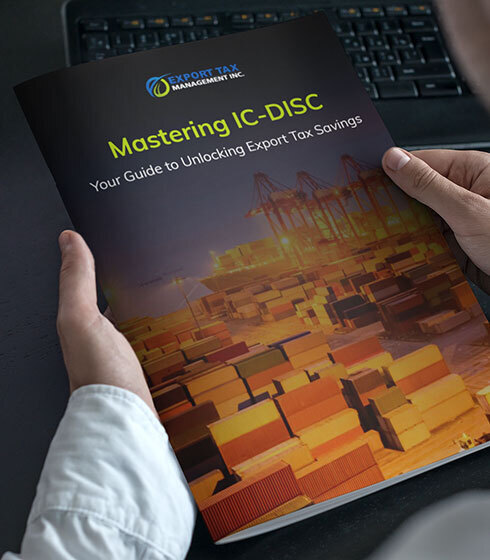Tax incentives for exporters allow United States-based corporations exporting to foreign countries to increase their savings and lower their tax liability. The goal of these incentives is to maximize foreign exports. What are tax incentives to exporters, and how do they work?
The two primary US-based tax incentives for exporters are the Interest Charge Domestic International Sales Corporation or IC-DISC and Foreign Derived Tangible Income or FDII. An IC-DISC is a separately formed business entity that makes a commission on certain export sales. The federal tax rates are lower when distributing those payments as qualified dividends.
This guide to export incentives will explain your options in more detail, the expected tax benefits and other advantages, and how to begin reaping tax savings.
Overview of Tax Incentives for Exporters in the USA

According to the International Trade Administration, the US already exports $2 trillion in services and goods worldwide but can always afford to expand.
That’s why Congress created the IC-DISC in 1971. That’s not the only tax incentive for US corporations with foreign presences, with FDII another popular option.
Export Tax Management Inc. specializes in IC-DISC incorporation, compliance, and implementation. Explore your tax incentive options with our services.
The Types of Tax Incentives for Exporters in the USA
Here’s an overview of the tax incentives exporters can take advantage of:
Tax Credits
Tax credits allow taxpayers to deduct a specific amount by the dollar from their federal income taxes. Businesses pay less money on their taxes as a result. Tax credits can be partially refundable, fully refundable, or nonrefundable.
A refundable or partially refundable tax credit generates a refund according to the prescribed amount. States and the federal government will make tax credits available to qualifying businesses.
Tax Deductions

A tax deduction is another type of tax incentive exporters should consider. Businesses can subtract a sum from their taxable income, paying less on their taxes. The types of deductions include itemized or standard deductions.
You subtract the amount due by taxable income, and thanks to The Tax Cuts and Jobs Act, the amount of standard deductions is higher than ever
Some deductions small businesses and startups are eligible to claim on their tax returns are as follows:
- Startup expenses
- Vehicle costs
- Property, sales, and local taxes
- Maintenance and repairs
- Pass-through tax deductions
- Loan interest
- Regulatory and licensing fees
- Professional and legal fees
- Insurance
- Equipment
- Bad debts
- Marketing and advertising
- Business travel
Tax Exemptions
Exporters should also look into their tax exemption eligibility. A tax exemption reduces the corporation’s tax obligation. For example, municipal, county, and state governments offer exemptions.
IC-DISCs and other tax-exempt organizations can also reduce their federal income tax rate.
Tax incentives share many similarities, namely in how they reduce a corporation’s taxes owed. However, the different ways incentives lower taxes and the eligibility criteria make it worth a corporation’s time to thoroughly explore deductions versus credits versus exemptions, especially as they apply to IC-DISC and FDII.
Learn more about the differences between these two tax incentives for exporters.
Why the IC-DISC Is the Best Choice as a Tax Incentive
IC-DISC stands head and shoulders over FDII and other tax incentives for exporters eager to claim more tax savings. An IC-DISC is a Congress-issued tax incentive and tax code to broaden the scope of US sales in foreign countries and open the door to exporting.
Eligible companies must establish an IC-DISC separate from their main entity, with it operating as a tax-exempt entity without office space or employees. The exporter or shareholders must form the IC-DISC, with a required delineation between it and C corporations.
When the corporation makes an international sale, it owes the IC-DISC a commission. The commission is deductible as a business expense. No federal income taxes are owed until the IC-DISC begins paying owner dividends.
The dividends have a tax rate of only 23.8 percent.
When should a corporation consider applying for IC-DISC status? Seek this tax benefit if a high tax rate has impeded business growth. Export Tax Management Inc. can help you determine the right road to tax savings and incentives for your business.
Contact us today to determine if IC-DISC status is right for you.
IC-DISC Tax Returns: Credits and Deductions

According to Schedules C and E of IRS Tax Form 1120, qualifying corporations can make the following deductions:
- Freight insurance and freight
- Contributions
- Interest
- Licenses and taxes
- Bad debts
- Employee benefit programs
- Profit-sharing plans and pensions
- Maintenance and repairs
- Officer compensation
- Warehousing
- Sales commissions
- Rent
- Wages and salaries
- Advertising and market studies
- Nonqualified inclusions and dividends
- Qualified dividends
- Total inclusions and dividends
- IC-DISC dividends (including former DISCs)
- Global Intangible Low-Taxed Income or GILTI
- Inclusions from controlled foreign corporation sales, in which a lower-tier foreign corporation’s stock was sold
- Dividends from foreign sources where the foreign corporation owns at least 10 percent but is not a hybrid corporation
- Dividends from wholly-owned foreign subsidiaries
- Dividends from foreign corporations with less than, equal to, or more than 20 percent owned
- Dividends on certain preferred stocks from public utilities that are less than or more than 20 percent owned
- Dividends from foreign or domestic corporation debt-financed stock
- Dividends from foreign corporations that are less than or more than 20 percent owned outside of debt-financed stock
Maximizing your IC-DISC is simple with the right support, such as from Export Tax Management Inc. For example, a bakery that produces goods in the US but sells them internationally would qualify for IC-DISC status, lessening its tax burden.
Advantages of Joining the IC-DISC Tax Incentives for Exporters
Establishing an IC-DISC allows corporations to begin reaping the following advantages.
Delaying Taxes by Waiting to Pay Dividends on the Commission
While corporations under DISC status must still file taxes within nine months from the end of their tax year and by no later than the 15th day (unless that day falls on a weekend or holiday), when the corporation has to pay taxes under this tax incentive isn’t always the same.
A corporation can wait until it generates $10 million of export sales before paying the commission as a dividend. This limit resets every year.
Spending Less Money on Taxes

Corporations don’t want to spend more than necessary on their taxes, as the loss in capital can trickle down to other parts of the company. A bad tax year might cause a corporation to tighten its belt, reducing staff or making other changes to stay in the green.
Tax incentives for exporters can reduce their federal income tax spending, preventing the above cost-cutting measures from transpiring. IC-DISC corporations can take a deduction on export income of up to 50 percent.
Increasing a Corporation’s Income
Between delaying paying dividends on commissions and reducing federal income tax spending, a corporation will have more income. This wealth can go toward cost savings, expanding (such as hiring more staff or opening more offices and warehouses), and researching and developing new products and services.
Expanding Business Internationally
The additional income and ability to continue expanding its roster of goods and services will allow DISC-qualifying corporations to expand business internationally, increasing export revenue.
Exporting goods from the United States to other parts of the world gives businesses a competitive advantage, reduces risk (other economies might fluctuate less than their home economy), and increases access to tax incentives.
Is your corporation eager to explore tax incentives and ways to lower federal income tax? Reach out to Export Tax Management Inc. today and explore our services.
Requirements to Enjoy the IC-DISC Tax Incentives for Exporters

Corporations applying for tax-exempt status must understand the eligibility requirements for export tax incentives.
Here are the eligibility criteria an IC-DISC must meet:
- Up to 95 percent of its gross receipts must be qualified gross receipts.
- It must pass an export assets and gross receipts test.
- It must have only one stock class that’s valued at $2,500 or higher.
- It must have separate records from other business entities.
- Its qualified export assets must be worth 95 percent (or more) of its asset sums when adjusted.
Qualifying corporations must document all income and spending, including dividends, deductions, special deductions, inclusions, and gross income, even if the corporation doesn’t pay taxes thanks to its tax-exempt status.
The corporation must also file taxes by the required deadline. Avoid common mistakes, such as failing to meet IC-DISC status yet filing as one anyway, skipping or leaving off important parts of Tax Form 1120, and failing to check your math before filing.
Book a Consultation Now to Learn More About Tax Incentives for Exporters
Tax incentives for exporters, such as FDII and IC-DISC, pave the way toward a brighter world economy. Corporations can expand their horizons and earn more export incentives for their time and effort.
Expedite your growth today by contacting Export Tax Management Inc.

